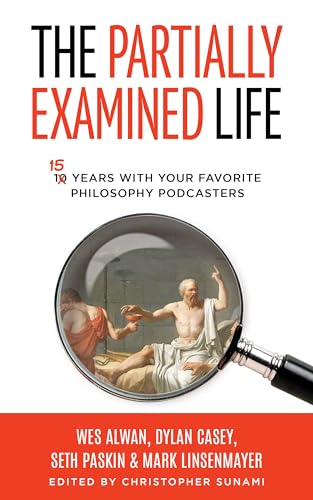“The unexamined life is not worth living.”
This famous quote comes from the history of philosophy, supposedly said by Socrates, as recounted by Plato, in his “Apology.”
Over the years, however, this quote has also become a kind of aphorism, suggesting that philosophy — that is, discussions around the ideas of historical and modern philosophers — is not just for university academics and their students, but even for we mere mortals, living down here in the common plane of everyday existence.
This quote also serves as the title of episode 1 of The Partially Examined Life Podcast, where the three founding hosts — Mark, Seth, and Wes — discuss Plato’s Apology and the trial of Socrates at length, in their wonderfully informal and inaugural podcast discussion. And a well-edited partial transcript of this first episode also serves as the first chapter of their forthcoming book, “The Partially Examined Life: 15 Years with Your Favorite Philosophy Podcasters.”
The book is planned for publication by the end of April 2024, and I was able to get my hands on an advance copy. Read on for my thoughts.
The Partially Examined Life is (I believe) the longest-running podcast on philosophy, and, I’d say, the best. And trust me, I’ve tried almost all of them.
In the podcast, the 4 hosts — Dylan (who joined as a regular shortly after the podcast’s start), Mark, Seth, and Wes — usually tackle a single topic or philosopher at a time, and dive right into having a debate about those ideas.
The nice thing about it: there isn’t any boring exposition or detailed historical background. They give you just enough background to be able to understand the debate, and then they just get on with it, and begin the debate.
This new book, published 15 years after the podcast first began, is like a wonderful “tasting menu” of some of their best episodes. The transcripts are heavily edited to keep the reading lively and to focus on the most interesting sections of each chosen episode. There are also some “interlude” chapters where hosts provide some of their own perspective on an issue.
I particularly loved the episodes with Michael Sandel, including on “What Money Can’t Buy,” and all the debate that is contained thereafter. But the Pat Churchland episode on neurobiology and philosophy was truly delightful (and newly relevant, in the age of AI — the episode dated back to 2011). That had me realizing I had somehow skipped that episode (it was an early one in their archive), and that thus led me to re-listen to it. Which was very joyful indeed!
And so, this illustrates exactly how, I think, this book is meant to be used. If you are not already a fan of this podcast, this book lets you get a sense of the archive simply by skimming or skipping around the chapters. But, if you are a fan of the podcast, like I am, it lets you discover episodes you might have skipped over, because, after all, this podcast has been running for 15 years and has over 300 episodes.
A truly unique book, for a truly unique podcast series. I highly recommend you buy the book, listen to the podcast, and, if you’ve got some spare change, support the podcast via their “Citizens” supporter program. Doing so will also unlock the full-length episodes and special features from their podcast archive and future releases.
If I had to pick one thing I did in 2021 to stop the doomscrolling loop, it was reigniting my love of philosophy via The Partially Examined Life podcast. And it has been a joy to work my way through their thought-provoking “Citizens” archive in the last 3 years. Now, I have the excellent book to match.
Cheers to 15 more years of philosophy discussion!

